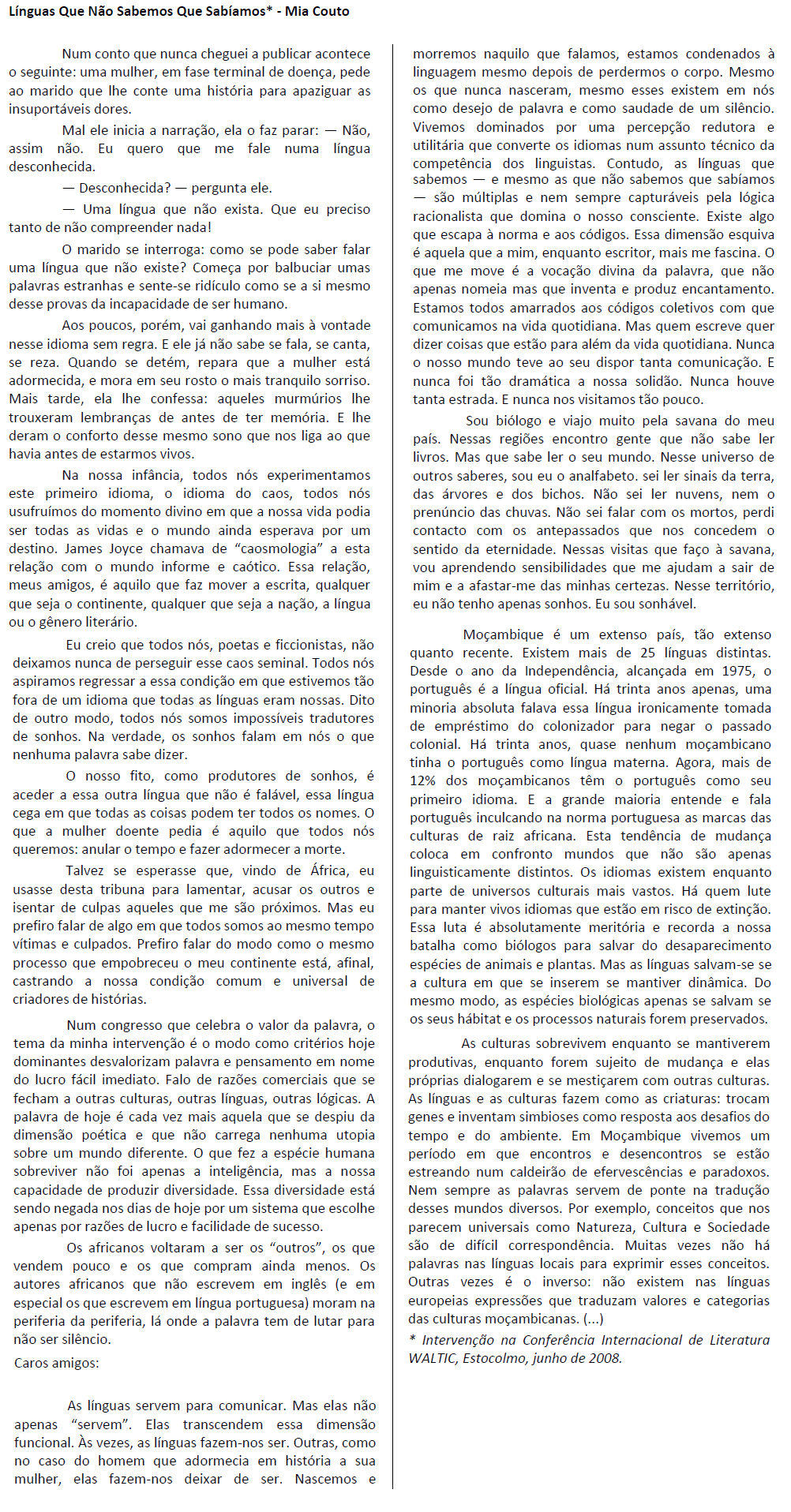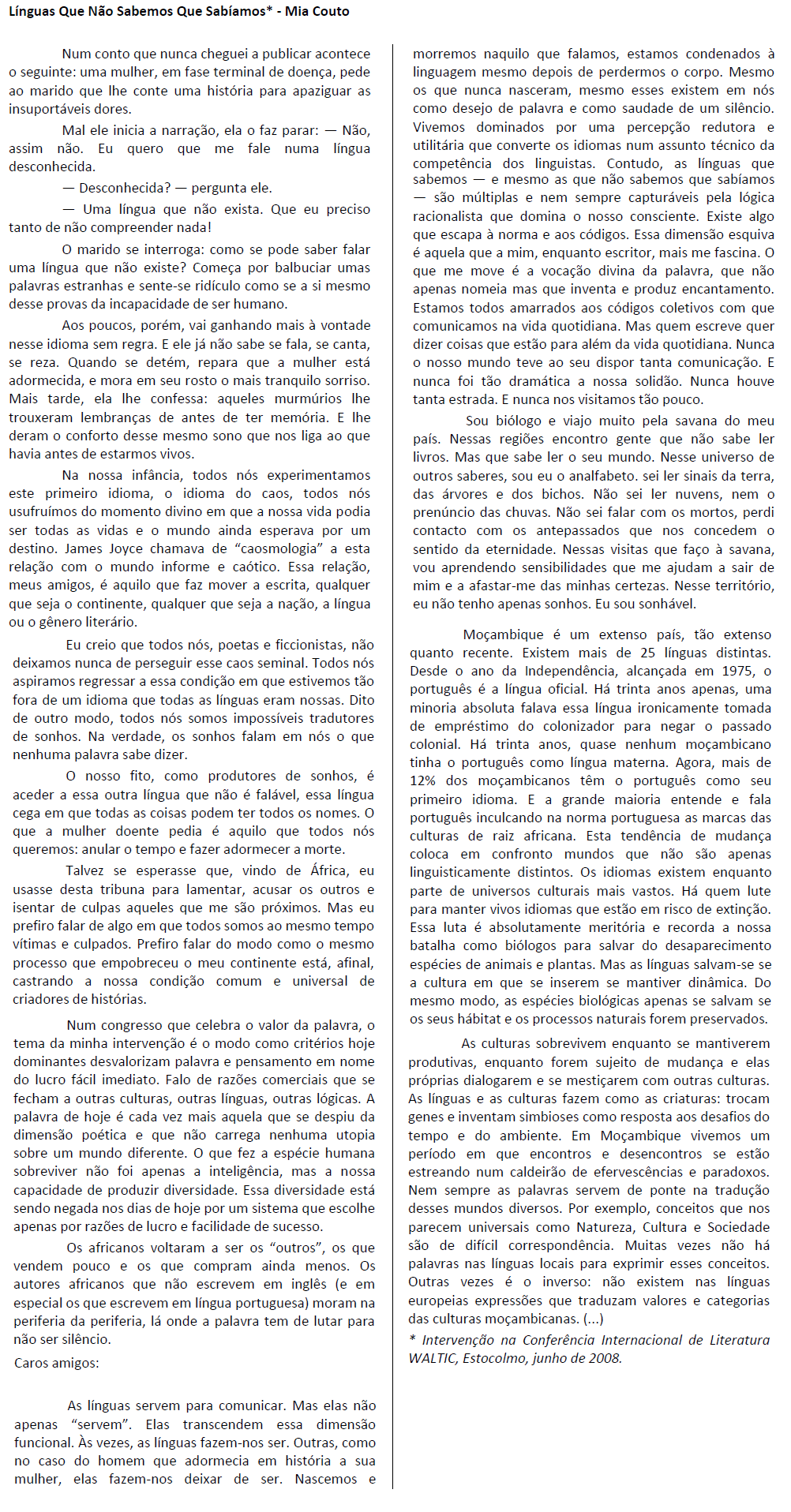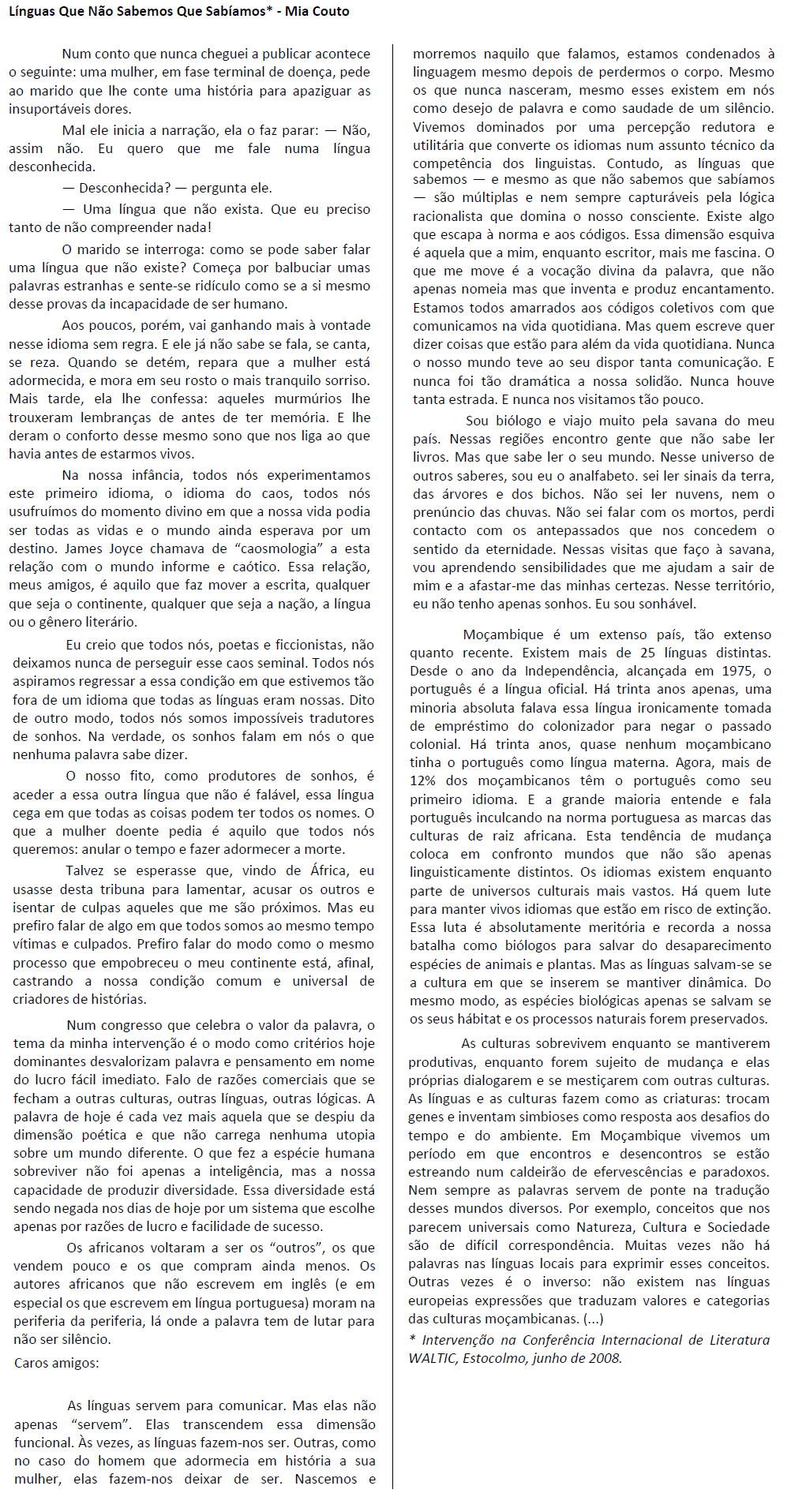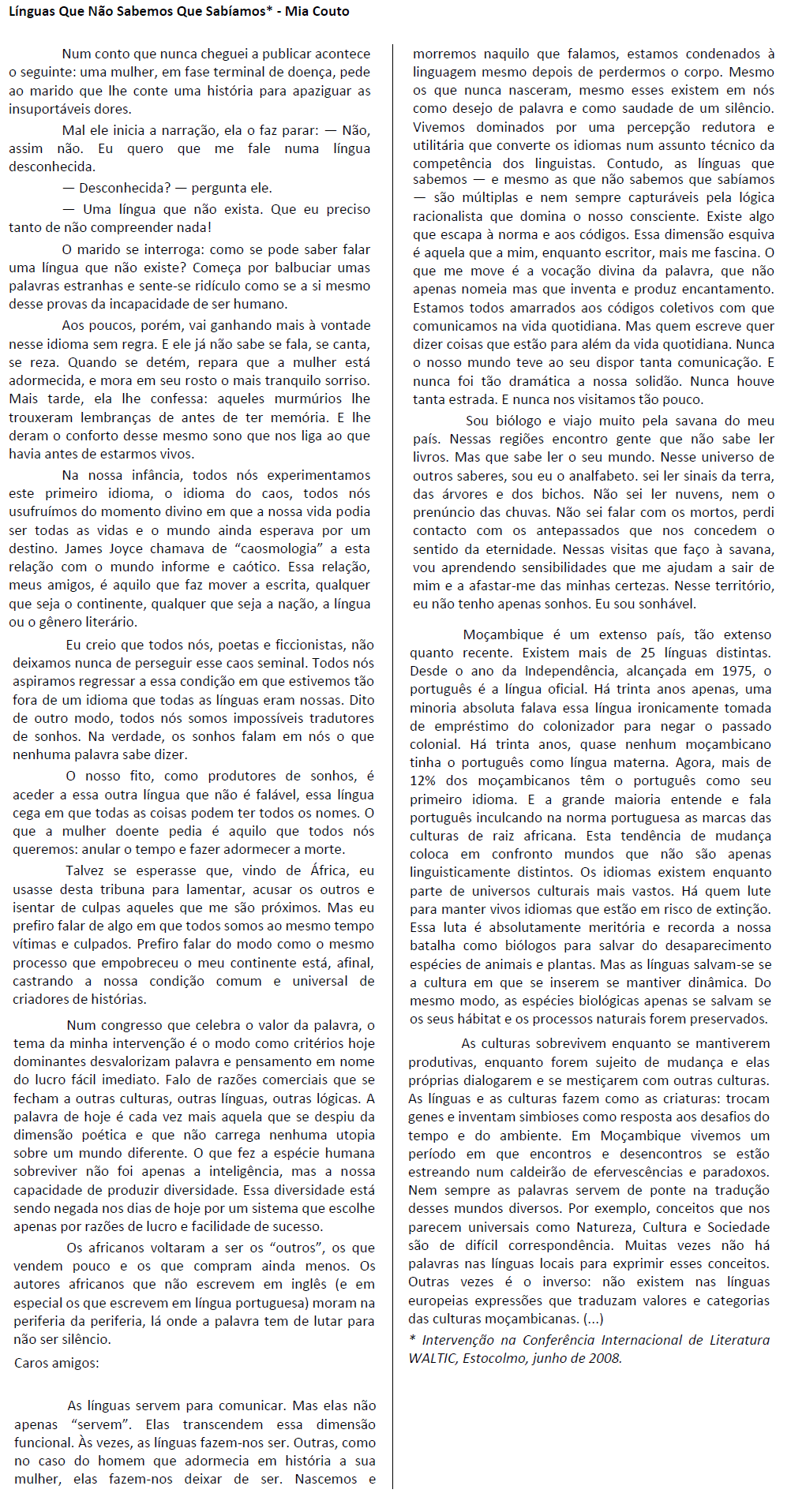“Trabalhar com geoinformação significa, antes de mais nada, utilizar computadores como instrumentos de representação de dados espacialmente referenciados. Deste modo, o problema fundamental da Ciência da Geoinformação é o estudo e a implementação de diferentes formas de representação computacional do espaço geográfico.”
(CÂMARA, G.; DAVIS, C.; MONTEIRO, A. M. V. (Ed.). Introdução à ciência da geoinformação. São José dos Campos: INPE, 2001. p. 5. (INPE-8562-PRE/4306)).
A respeito da aplicabilidade do Geoprocessamento e dos Sistemas de Informação Geográfica (SIG) e, considerando a reflexão colocada por Câmara (2001) e seus conhecimentos sobre o assunto, analise as potenciais utilizações expostas nas alternativas a seguir:
- Um sociólogo pode usar um SIG para entender e quantificar o fenômeno da exclusão social numa grande cidade brasileira.
- Um ecólogo pode usar o SIG com o objetivo de compreender os remanescentes florestais da Mata Atlântica, através do conceito de fragmento típico de Ecologia da Paisagem.
- Um geólogo pode usar um SIG para determinar a distribuição de um mineral numa área de prospecção, a partir de um conjunto de amostras de campo.
- Um geógrafo pode usar um SIG para entender o padrão de distribuição espacial da população de uma determinada região metropolitana brasileira.
Estão corretas:
“A constatação da existência das placas tectônicas deu uma nova roupagem às antigas ideias da Deriva Continental, explicando satisfatoriamente muitas das grandes feições geológicas da Terra, como as grandes cordilheiras de montanhas, como os Andes, e respondendo a questões, por exemplo, sobre as concentrações dos sismos e vulcões atuais ou sobre as rochas que já estiveram no fundo dos oceanos e estão hoje no topo de grandes cadeias montanhosas, como nos Himalaias”.
(TASSINARI, C. C. G. et al. Tectônica Global. In: Decifrando a Terra. São Paulo: Oficina de Textos, 2000. 2ª reimpressão, 2003)
Com base nesta reflexão, na figura a seguir e em seus conhecimentos sobre a teoria da tectônica de placas, identifique os itens certos e os itens errados

( ) Zonas de convecção são locais onde a crosta oceânica mais densa mergulharia para o interior da Terra até atingir condições de pressão e temperatura suficientes para sofrer fusão e ser incorporada novamente ao manto.
( ) A teoria da Tectônica de Placas nasceu quando surgiram os primeiros mapas das linhas das crostas atlânticas da América do Sul e da África. Em 1620, Francis Bacon, filósofo inglês, apontou o perfeito encaixe entre estas duas costas e levantou a hipótese de que estes continentes estiveram unidos no passado.
( ) As evidências mais impressionantes da existência de um supercontinente interligado foram a presença de fósseis de Glossopteris em regiões da África e Brasil, cujas evidências se correlacionavam perfeitamente, ao se juntarem os continentes e evidências de glaciação, há aproximadamente 300 Ma.
( ) O supercontinente Pangea teria iniciado a sua fragmentação dividindo-se em dois continentes, sendo o setentrional chamado de Laurásia e a austral de Gondwana.
A alternativa que apresenta a sequência adequada é:
“Criada pelos humanistas italianos e retomada por Vasari, a noção de uma ressurreição das letras e das artes graças ao reencontro com a Antiguidade foi, seguramente, fecunda como fecundos são todos os manifestos lançados em todos os séculos por novas gerações conquistadoras. Essa noção significa juventude... dinamismo, vontade de renovação. Teve em si a inevitável injustiça das abruptas declarações de adolescentes, que rompem ou creem romper com os gostos e as categorias mentais dos seus antecessores. Mas o termo «Renascimento», mesmo na acepção estrita dos humanistas, que o aplicavam, essencialmente, à literatura e às artes plásticas, parece-nos atualmente insuficiente. Parece rejeitar, como bárbaras, as criações simultaneamente sólidas e misteriosas da arte românica e aqueloutras, mais esbeltas e dinâmicas, da idade gótica. Não dá conta nem de Dante, nem de Villon, nem da pintura flamenga do século XV. E, principalmente, ao ser alargado às dimensões de uma civilização pela historiografia romântica, mostrou-se inadequado”
(DELUMEAU, J. A civilização do renascimento. Lisboa: Editorial Estampa, 1983, p.19).
São artistas consagrados do Renascimento europeu:
“A violência do movimento nacional-socialista, com a ajuda de associações de defesa privadamente organizadas, tinha causado a quase completa dissolução do monopólio de força — sem o qual um Estado, a longo prazo, não pode funcionar — e destruiu a República de Weimar de dentro para fora (...) O plano da juventude nacionalista desses dias, que tinha frequentemente se unido para formar grupos de combate, era um tanto vago e negativamente definido. Ernst Jünger escreveu que nada tinha a ver com monarquia, conservadorismo, reação burguesa ou com o patriotismo do período guilhermino. Através da tomada do poder por Hitler, esse propósito negativo recebeu um rosto positivo. Assim, 30 de junho de 1934 foi o símbolo típico, quase paradigmático, do divisor de águas no desenvolvimento de um movimento revolucionário radical, que obteve êxito e cujos adeptos se converteram, então, de destruidores do Estado em representantes do Estado”.
ELIAS, N. Os alemães. Rio de Janeiro: Jorge Zahar Ed. 1997, p. 208).
O nazismo é um dos grandes temas do século XX, ainda gerando perplexidades e espanto hoje em dia. Sobre o esse fenômeno e seu correlato, fascismo, é INCORRETA a seguinte afirmação:
“Muita gente no chamado mundo ocidental ou metropolitano, bem como seus parceiros do Terceiro Mundo ou das ex-colônias, concorda que a época do grande imperialismo clássico, o qual atingiu seu clímax
na “era do império”, segundo a descrição de Eric Hobsbawm, e terminou mais ou menos formal com o desmantelamento das grandes estruturas coloniais após a Segunda Guerra Mundial, continua a exercer, de uma ou outra maneira, uma influência cultural considerável no presente. Pelas mais variadas razões, sente-se uma nova premência de entender o que permanece ou não permanece do passado, e essa premência se introduz nas percepções do presente e do futuro”
(SAID, E. Cultura e Imperialismo. São Paulo: Companhia das Letras, 2010, p. 38”.
Sobre o imperialismo é INCORRETO afirmar que:
“Sete anos e um dia após o suicídio de Getúlio Vargas, outro presidente, igualmente eleito com expressiva votação popular, deixava o poder de forma traumática. Mas, além de carecer do sentimento de grandeza, inegável no gesto de Getúlio, a renúncia de Jânio Quadros permanece até hoje envolta na polêmica que ora enxerga o golpe, ora a insanidade do protagonista. E a crise que provocou, pela tentativa militar de se impedir a investidura constitucional do vice João Goulart, quase leva o país à guerra civil”
BENEVIDES, M. O governo Jânio Quadros. Rio de Janeiro: 1982, p. 7).
Dentro do quadro traumático que foi o curto governo Jânio Quadros, podemos entender que:
Text 1:
How being bilingual can boost your career
Whether you’re fresh out of college or a seasoned executive, insiders agree that fluency in a second language can not only help you stand out among prospective employers, it can also open doors to opportunities that those without foreign language skills might miss.
In today’s global economy, the ability to communicate in another language has become a significant advantage in the workforce. Research has found that people who speak at least one foreign language have an average annual household income that’s $10,000 higher than the household income of those who only speak English. And about 17 percent of those who speak at least one foreign language earn more than $100,000 a year.
A recent survey found that nearly 9 out of 10 headhunters in Europe, Latin America, and Asia say that being at least bilingual is critical for success in today’s business environment. And 66 percent of North American recruiters agreed that being bilingual will be increasingly important in the next 10 years.
“In today’s global economy you really have to understand the way business is done overseas to maximize your potential. A second language equips you for that,” says Alister Wellesley, managing partner of a Connecticut-based recruiting firm. “If you’re doing business overseas, or with someone from overseas, you obtain a certain degree of respect if you’re able to talk in their native language.”
Language skills can also be key for service industries. At the Willard InterContinental Washington, a luxury hotel a few blocks from the White House, a staff of about 570 represents 42 nations, speaking 19 languages. The Willard’s front-of-house employees such as the concierge speak at least two languages. Bilingualism is not an absolute requirement, but it is desirable, according to Wendi Colby, director of human resources.
Workers with skills in a second language may have an edge when it comes to climbing Willard’s professional ladder. “The individual that spoke more languages would have a better chance for a managerial role, whatever the next
level would be,” Colby says. “They are able to deal with a wide array of clients, employees.”
So which languages can give you a leg up on the job market? Insiders agree the most popular – and marketable – languages are Spanish, German, French, Italian, Russian and Japanese, with a growing emphasis on Mandarin, given China’s booming economy. So let’s learn Mandarin!
“We see demand from a full range of industries,” says Wellesley. “Actually it depends on which company you’re working for and the country in which they’re located.”
Adapted from: LATHAM-KOENIG, Christina & OXENDEN,
Clive. American English File 5. 2nd edition. Oxford: OUP,
2018.
Choose the expression taken from the text that CANNOT be considered a nominal group.
Text 1:
How being bilingual can boost your career
Whether you’re fresh out of college or a seasoned executive, insiders agree that fluency in a second language can not only help you stand out among prospective employers, it can also open doors to opportunities that those without foreign language skills might miss.
In today’s global economy, the ability to communicate in another language has become a significant advantage in the workforce. Research has found that people who speak at least one foreign language have an average annual household income that’s $10,000 higher than the household income of those who only speak English. And about 17 percent of those who speak at least one foreign language earn more than $100,000 a year.
A recent survey found that nearly 9 out of 10 headhunters in Europe, Latin America, and Asia say that being at least bilingual is critical for success in today’s business environment. And 66 percent of North American recruiters agreed that being bilingual will be increasingly important in the next 10 years.
“In today’s global economy you really have to understand the way business is done overseas to maximize your potential. A second language equips you for that,” says Alister Wellesley, managing partner of a Connecticut-based recruiting firm. “If you’re doing business overseas, or with someone from overseas, you obtain a certain degree of respect if you’re able to talk in their native language.”
Language skills can also be key for service industries. At the Willard InterContinental Washington, a luxury hotel a few blocks from the White House, a staff of about 570 represents 42 nations, speaking 19 languages. The Willard’s front-of-house employees such as the concierge speak at least two languages. Bilingualism is not an absolute requirement, but it is desirable, according to Wendi Colby, director of human resources.
Workers with skills in a second language may have an edge when it comes to climbing Willard’s professional ladder. “The individual that spoke more languages would have a better chance for a managerial role, whatever the next level would be,” Colby says. “They are able to deal with a wide array of clients, employees.”
So which languages can give you a leg up on the job market? Insiders agree the most popular – and marketable – languages are Spanish, German, French, Italian, Russian and Japanese, with a growing emphasis on Mandarin, given China’s booming economy. So let’s learn Mandarin!
“We see demand from a full range of industries,” says Wellesley. “Actually it depends on which company you’re working for and the country in which they’re located.”
The sentence “Bilingualism is not an absolute requirement, but it is desirable” could be rewritten, with no change in meaning, as:
Text 1:
How being bilingual can boost your career
Whether you’re fresh out of college or a seasoned executive, insiders agree that fluency in a second language can not only help you stand out among prospective employers, it can also open doors to opportunities that those without foreign language skills might miss.
In today’s global economy, the ability to communicate in another language has become a significant advantage in the workforce. Research has found that people who speak at least one foreign language have an average annual household income that’s $10,000 higher than the household income of those who only speak English. And about 17 percent of those who speak at least one foreign language earn more than $100,000 a year.
A recent survey found that nearly 9 out of 10 headhunters in Europe, Latin America, and Asia say that being at least bilingual is critical for success in today’s business environment. And 66 percent of North American recruiters agreed that being bilingual will be increasingly important in the next 10 years.
“In today’s global economy you really have to understand the way business is done overseas to maximize your potential. A second language equips you for that,” says Alister Wellesley, managing partner of a Connecticut-based recruiting firm. “If you’re doing business overseas, or with someone from overseas, you obtain a certain degree of respect if you’re able to talk in their native language.”
Language skills can also be key for service industries. At the Willard InterContinental Washington, a luxury hotel a few blocks from the White House, a staff of about 570 represents 42 nations, speaking 19 languages. The Willard’s front-of-house employees such as the concierge speak at least two languages. Bilingualism is not an absolute requirement, but it is desirable, according to Wendi Colby, director of human resources.
Workers with skills in a second language may have an edge when it comes to climbing Willard’s professional ladder. “The individual that spoke more languages would have a better chance for a managerial role, whatever the next level would be,” Colby says. “They are able to deal with a wide array of clients, employees.”
So which languages can give you a leg up on the job market? Insiders agree the most popular – and marketable – languages are Spanish, German, French, Italian, Russian and Japanese, with a growing emphasis on Mandarin, given China’s booming economy. So let’s learn Mandarin!
“We see demand from a full range of industries,” says Wellesley. “Actually it depends on which company you’re working for and the country in which they’re located.”
Adapted from: LATHAM-KOENIG, Christina & OXENDEN, Clive. American English File 5. 2nd edition. Oxford: OUP, 2018.
Wendy told John, one of her coworkers: “Don’t be late!”
Choose, among the options below, the correct sentence in reported speech:
According to text 2, teachers should give students advice.
Choose the only sentence below in which the noun ADVICE is used correctly.
“Muitas vezes não há palavras nas línguas locais para exprimir esses conceitos.” Em relação ao verbo destacado é correto afirmar que:
“Num congresso que celebra o valor da palavra, o tema da minha intervenção é o modo como critérios hoje dominantes desvalorizam palavra e pensamento em nome do lucro fácil imediato.” A concordância está correta em:
“Os autores africanos que não escrevem em inglês (e em especial os que escrevem em língua portuguesa) moram na periferia da periferia, lá onde a palavra tem de lutar para não ser silêncio.” Os parênteses foram usados para:
“Talvez se esperasse que, vindo de África, eu usasse desta tribuna para lamentar, acusar os outros e isentar de culpas aqueles que me são próximos.” A oração reduzida destacada estabelece uma relação com a anterior de:
Um quadrilátero ABCD possui fixos os vértices A(12,0), B(0,0) e D(16,8). O comprimento do lado BC permanece constante e igual a 4 unidades. Sabendo-se que o lugar geométrico (conjunto de pontos que seguem determinada regra) do ponto médio do segmento de reta que liga os pontos médios das diagonais AC e BD é uma circunferência, o par ordenado do centro desta circunferência, bem como o seu raio são, respectivamente:





